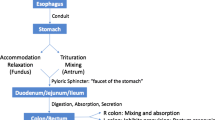Abstract
We challenged the two hypotheses: first, that defecation can be suppressed for an extended time, and second, if so, that this has an effect on upper colonic motility. Thus we studied 12 male volunteers with conditions of identical nutrition and patterns of physical activity over a two-week period, where one week with normal defecation and one week with voluntary prolonged suppression of defecation followed each other in randomized order. Frequencies of defecation, stool weights, total and segmentai colonic transit times (using radiopaque markers) were compared. Frequency of defecations and stool weights were lower during suppressed defecation [8.9±0.66 vs 3.7±0.41 (mean±SE) bowel movements per week, P=0.003, and 1.30±0.09 vs 0.98±0.13 kg/week, P=0.01]. Total transit times were increased from 28.8±4.4 to 53.1±4.3 hr, P=0.004. Segmental transit times were increased in the rectosigmoid (from 8.83±3.6 to 32.1±5.6 hr, P=0.04) and right hemicolon (from 14.5±0.9 hr to 19.7±1.5 hr, P=0.02) by suppression of defecation. We conclude that defecation habits may induce changes in colonic function such as those seen in constipation and that functional anorectal outlet obstruction may, probably by reflex mediation, affect the right colon.
Similar content being viewed by others
References
Knauer CM, Silverman S Jr: Alimentary tract and liver.In Current Medical Diagnosis and Treatment 1990, SA Schroeder, MA Krupp, LM Tierney Jr, SJ McPhee (eds). Englewood Cliffs, Prentice-Hall, 1990, pp 376–460
LaMont JT, Isselbacher KJ: Diseases of the small and large intestine.In Harrison's Principles of Internal Medicine, 11th ed. E Braunwald, KJ Isselbacher, RG Petersdorf, JD Wilson, JB Martin, AS Fauci (eds). New York, McGraw-Hill, 1988, pp 1290–1302
Phillips S: Disorders of gastrointestinal motility.In Cecil Textbook of Medicine, 18th ed. JB Wyngaarden, HS Lloyd (eds). Philadelphia, WB Saunders, 1988, pp 714–725
Wald A, Van Thiel DH, Hoechstetter L, Gavaler JS, Egler KM, Verm R, Scott L, Lester R: Gastrointestinal transit. The effect of the menstrual cycle. Gastroenterology 80:1497–1500, 1981
Rees WDW, Rhodes J: Altered bowel habit and menstruation. Lancet 2:475, 1976
Hinton JM, Lennard-Jones JE, Young AC: A new method for studying gut transit times using radioopaque markers. Gut 10:842–847, 1969
Cummings JH, Jenkins DJA, Wiggins HS: Measurement of the mean transit time of dietary residue through the human gut. Gut 17:210–218, 1976
Chaussade S, Roche H, Khyari A, Couturier D, Guerre J: Mesure du temps de transit colique (TTC): Description et validation d'une nouvelle technique. Gastroenterol Clin Biol 10:385–389, 1986
Arhan P, Devroede G, Jehannin B, Lanza M, Faverdin C, Dornic C, Persoz B, Tetreault L, Perey B, Pellerin D: Segmental colonic transit time. Dis Colon Rectum 24:625–629, 1981
Metcalf AM, Phillips SF, Zinsmeister AR, MacCarty RL, Beart RW, Wolff BG: Simplified assessment of segmental colonic transit. Gastroenterology 92:40–47, 1987
Fotherby KJ, Hunter JO: Idiopathic slow-transit constipation: Whole gut transit times, measured by a new simplified method, are not shortened by opioid antagonists. Aliment Pharmacol Ther 1:331–338, 1987
Haubrich WS: Constipation.In Bockus Gastroenterology, 4th ed. JE Berk, WS Haubrich, MH Kalser, JLA Roth, F Schaffner (eds). Philadelphia, WB Saunders, 1985, pp 111–124
Devroede G: Constipation.In Gastrointestinal Disease, 4th ed. MH Sleisenger, JS Fordtran (eds). Philadelphia, WB Saunders, 1989, pp 331–368
Connell AM, Hilton C, Irvine G, Lennard-Jones JE, Misiewicz JJ: Variation of bowel habits in two population samples. Bri Med J 2:1095–1099, 1965
Stephen AM, Wiggins HS, Cummings JH: Effect of changing transit time on colonic microbial metabolism in man. Gut 28:601–609, 1987
Devroede G, Soffié M: Colonic absorption in idiopathic constipation. Gastroenterology 64:552–561, 1973
Krevsky B, Malmud LS, D'Ercole F, Maurer AH, Fisher RS: Colonic transit scintigraphy. A physiologic approach to the quantitative measurement of colonic transit in humans. Gastroenterology 91:1102–1112, 1986
Christensen J: Motility of the colon.In Physiology of the Gastrointestinal Tract, 2nd ed. LR Johnson (ed). New York, Raven Press, 1987, pp 665–693
Youle MS, Read NW: Effect of painless rectal distension on gastrointestinal transit of solid meal. Dig Dis Sci 29:902–906, 1984
Preston DM, Lennard-Jones JE: Anismus in chronic constipation. Dig Dis Sci 30:413–418, 1985
Author information
Authors and Affiliations
Rights and permissions
About this article
Cite this article
Klauser, A.G., Voderholzer, W.A., Heinrich, C.A. et al. Behavioral modification of colonic function. Digest Dis Sci 35, 1271–1275 (1990). https://doi.org/10.1007/BF01536418
Received:
Revised:
Accepted:
Issue Date:
DOI: https://doi.org/10.1007/BF01536418




